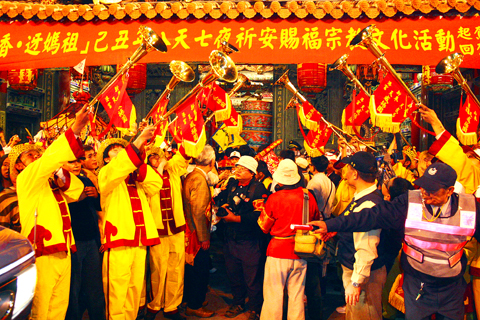Two temples in central Taiwan, separated by a river but consecrated to the same Chinese goddess — Matsu (媽祖) — have decided to end a six-decade dispute over which of them is the orthodox temple serving the former Benkang area.
Fongtian Temple (奉天宮) in Chiayi County’s Hsinkang Township (新港) and Chaotien Temple (朝天宮) in Yunlin County’s Peikang Township (北港) have not been on speaking terms for more than 60 years because the leaders of both temples have been unhappy with each other’s claim that they represent the area’s orthodox lineage in Matsu worship.
Fongtian Temple was built in 1700 in what was formerly the Bengang area, but was ruined by a flood in 1799. It was rebuilt at a different location in 1812 and became what it is today.

PHOTO: CNA
Chaotien Temple started in the 1690s as a small shrine in the same area and was expanded to a temple in the 1770s.
Flooding of the Beigang river in 1750 resulted in a topographical change and divided the former Benkang area into two parts, with Beigang township located on the north side of the river and Singang township on the south side.
The rivalry was aggravated 20 years ago when the famous Chenlan Temple in Tachia Township (大甲), Taichung County, stopped its annual pilgrimage to Chaotien Temple after welcoming a new Matsu statue from Meizhou in China’s Fujian Province. It now takes the statue on a visit to Fongtian Temple every April.
At a meeting on Jan. 22 shortly before the Lunar New Year, Ho Da-huang (何煌達), chairman of Fongtian Temple’s board of directors, and Tseng Tsai Mei-tso (曾蔡美佐), chairwoman of Chaotien Temple, reached a consensus on the need for mutual reconciliation between the temples.
With the blessings of their respective board members, Ho and Tsai agreed that worshipers at Fongtian Temple would take their Matsu statue on an “ice breaking” visit to Chaotien Temple.
The eight-day journey began on Saturday, and tomorrow the temples’ Matsu statues will meet in Chaotien Temple with worshipers from both temples burning incense together.
Matsu, worshipped as the goddess of the sea, is said to have been born in 960AD into a fisherman’s family in China’s Fujian Province in the Sung Dynasty and was given the name Lin Mo-niang (林默娘).
Legend says she had supernatural powers and had the ability to calm storms at sea. The numerous miracles attributed to her include rescuing sailors in distress and curing the sick with her vast knowledge of Chinese medicine.
Legend has it that at the age of 28, she told her parents it was time for her to leave them. After reaching the top of a mountain near her home, she was encircled by clouds and carried into heaven in a golden glow of light amid enchanting celestial music.
She was deified and referred to as Matsu, or maternal ancestor.
Residents of Taiwan’s offshore island Matsu (馬祖), however, have a different version of the story. They believe that she drowned while trying to rescue her father from a storm at sea and that her body was washed ashore on the island of Nangan (南竿).

An essay competition jointly organized by a local writing society and a publisher affiliated with the Chinese Communist Party (CCP) might have contravened the Act Governing Relations Between the People of the Taiwan Area and the Mainland Area (臺灣地區與大陸地區人民關係條例), the Mainland Affairs Council (MAC) said on Thursday. “In this case, the partner organization is clearly an agency under the CCP’s Fujian Provincial Committee,” MAC Deputy Minister and spokesperson Liang Wen-chieh (梁文傑) said at a news briefing in Taipei. “It also involves bringing Taiwanese students to China with all-expenses-paid arrangements to attend award ceremonies and camps,” Liang said. Those two “characteristics” are typically sufficient

A magnitude 5.9 earthquake that struck about 33km off the coast of Hualien City was the "main shock" in a series of quakes in the area, with aftershocks expected over the next three days, the Central Weather Administration (CWA) said yesterday. Prior to the magnitude 5.9 quake shaking most of Taiwan at 6:53pm yesterday, six other earthquakes stronger than a magnitude of 4, starting with a magnitude 5.5 quake at 6:09pm, occurred in the area. CWA Seismological Center Director Wu Chien-fu (吳健富) confirmed that the quakes were all part of the same series and that the magnitude 5.5 temblor was

The brilliant blue waters, thick foliage and bucolic atmosphere on this seemingly idyllic archipelago deep in the Pacific Ocean belie the key role it now plays in a titanic geopolitical struggle. Palau is again on the front line as China, and the US and its allies prepare their forces in an intensifying contest for control over the Asia-Pacific region. The democratic nation of just 17,000 people hosts US-controlled airstrips and soon-to-be-completed radar installations that the US military describes as “critical” to monitoring vast swathes of water and airspace. It is also a key piece of the second island chain, a string of

The Central Weather Administration has issued a heat alert for southeastern Taiwan, warning of temperatures as high as 36°C today, while alerting some coastal areas of strong winds later in the day. Kaohsiung’s Neimen District (內門) and Pingtung County’s Neipu Township (內埔) are under an orange heat alert, which warns of temperatures as high as 36°C for three consecutive days, the CWA said, citing southwest winds. The heat would also extend to Tainan’s Nansi (楠西) and Yujing (玉井) districts, as well as Pingtung’s Gaoshu (高樹), Yanpu (鹽埔) and Majia (瑪家) townships, it said, forecasting highs of up to 36°C in those areas